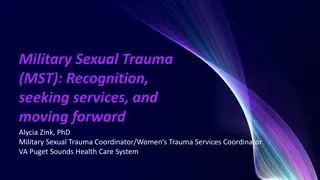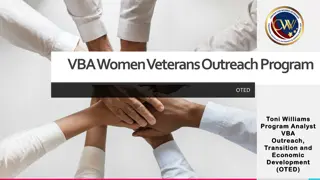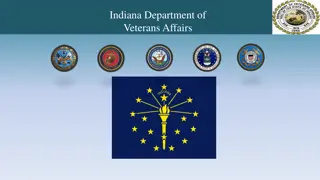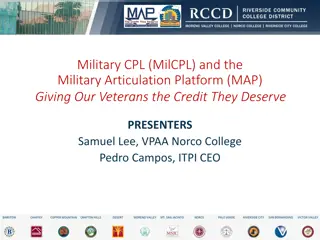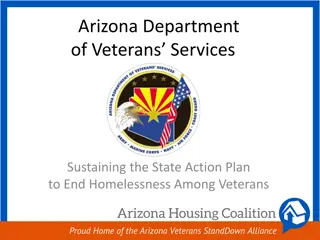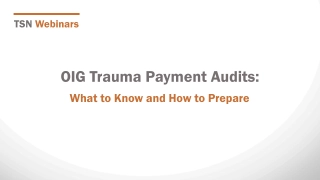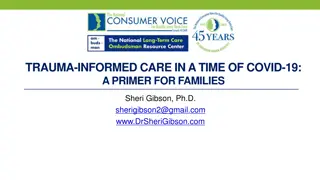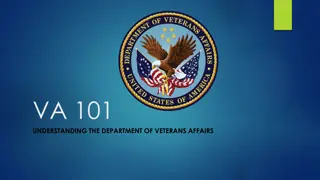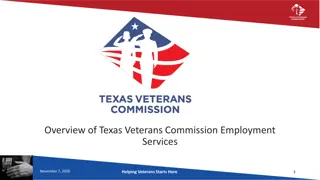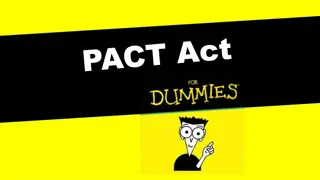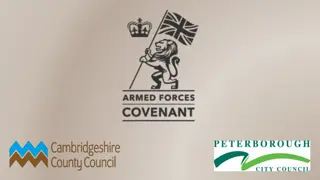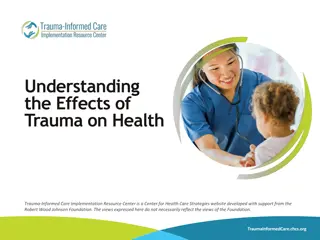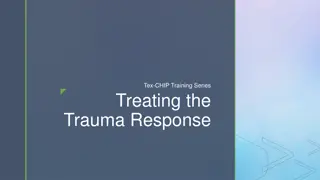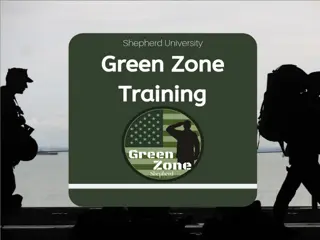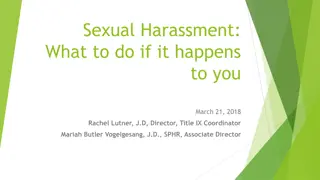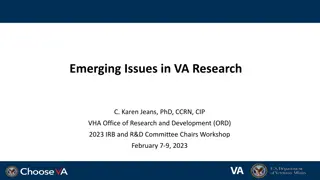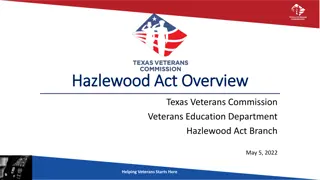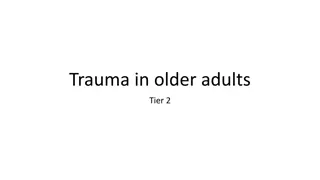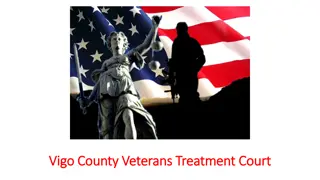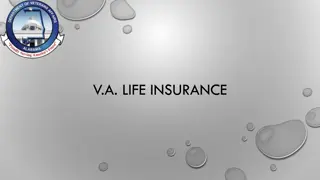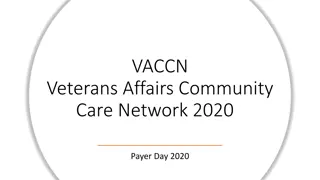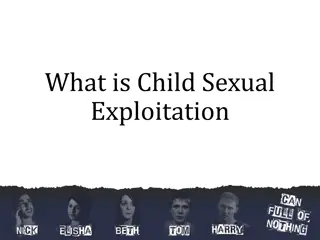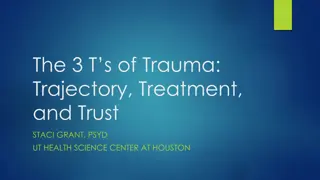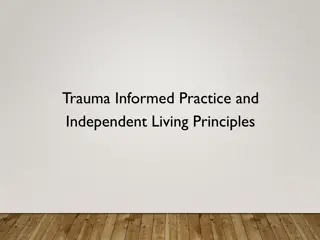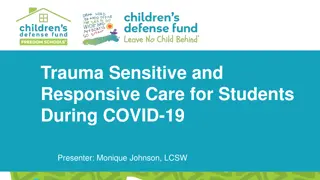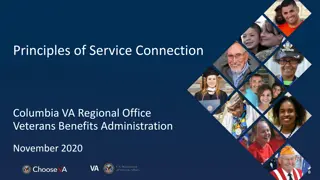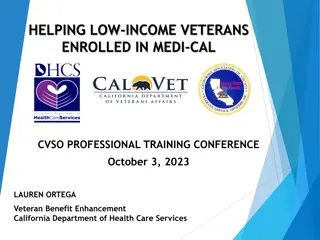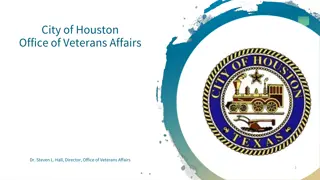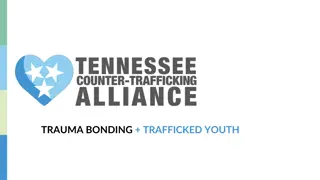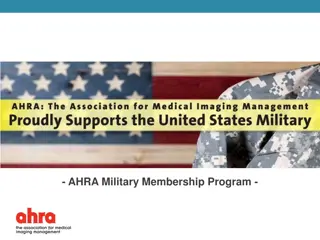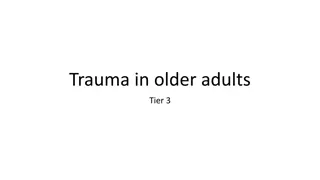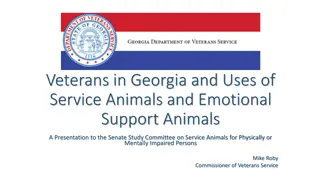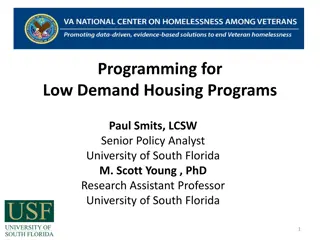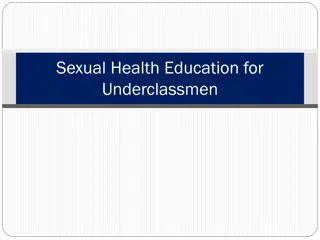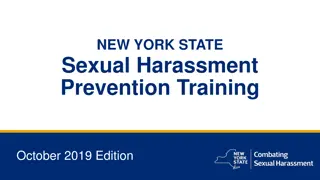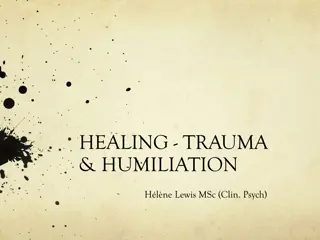Understanding Military Sexual Trauma (MST) and Supporting Veterans
This presentation by Christina McNeely provides valuable insights into military sexual trauma (MST) experienced by veterans, highlighting the definitions, prevalence, impacts, and the VA's response. It explores how MST differs from other traumas, addresses the needs of survivors during the claims process, and underscores the importance of staff members in aiding veterans' recovery. The session aims to enhance awareness and sensitivity towards MST survivors and their specific challenges.
Download Presentation

Please find below an Image/Link to download the presentation.
The content on the website is provided AS IS for your information and personal use only. It may not be sold, licensed, or shared on other websites without obtaining consent from the author. Download presentation by click this link. If you encounter any issues during the download, it is possible that the publisher has removed the file from their server.
E N D
Presentation Transcript
Veterans Who Experienced Military Sexual Trauma or Other Forms of Personal Trauma Christina McNeely, MSW, LCSW RLR VAMC Military Sexual Trauma Coordinator RLR VAMC Psychiatry Non-VA Care Consult Coordinator July 2018
Agenda Broad overview (the Big Picture) Definitions, prevalence, basic information on sexual trauma, VHA response, associated conditions Impact on Veterans (the More Focused Picture) How can experiencing MST be different than experiencing other traumas? How might this show up in the files that cross your desk? Veterans experience of the VBA claims process What you can do to help Resources and ways to learn more
Why This Topic? There are special statutes, policies, and benefits related to MST Knowing more about MST can help you do your job more effectively and sensitively MST survivors may have special needs during the C&P process Some survivor behaviors may be confusing if you don t understand their experience at the time and afterwards Although I focus on MST, much of what I present today applies to personal trauma or traumas and severe stressors more generally
Every VA staff member has the power to help Veterans recover from MST.
What is MST? VA s definition of MST comes from federal law (Title 38 U.S. Code 1720D) and is psychological trauma, which in the judgment of a VA mental health professional, resulted from a physical assault of a sexual nature, battery of a sexual nature, or sexual harassment which occurred while the Veteran was serving on active duty, active duty for training, or inactive duty training. Sexual harassment is further defined as "repeated, unsolicited verbal or physical contact of a sexual nature which is threatening in character. 5
What Is MST? (cont.) Any sort of sexual activity in which someone is involved against his or her will. Someone may be Pressured into sexual activities (e.g., with threats of consequences) Unable to consent to sexual activities (e.g., intoxicated) Physically forced into participation
What Is MST? (cont.) Other experiences that fall into the category of MST include unwanted sexual touching or grabbing; threatening, offensive remarks about a person's body or sexual activities; and threatening and unwelcome sexual advances Compliance does not mean consent
What Is MST? (cont.) MST can occur on or off base, while a Veteran was on or off duty It doesn t matter who the perpetrator is they can be men or women, military personnel or civilians, superiors or subordinates in the chain of command, strangers, friends, or intimate partners Veterans from all eras of service have reported experiencing MST
How Common is MST? This can be difficult to know, as sexual trauma is frequently underreported About 1 in 4 women and 1 in 100 men have told their VHA healthcare provider that they experienced sexual trauma in the military. Although women experience MST in higher proportions than do men, because of the large number of men in the military there are significant numbers of men and women seen in VA who have experienced MST. 9
Truths About Sexual Trauma Regardless of the victim s behavior, when all is said and done it is the perpetrator who chose to behave in the way he/she did. Men and men of all sexual orientations --can be victims of sexual trauma. Coercion comes in many forms (not just physical) and can be subjective. It is still sexual trauma even if victims do not physically resist. Nonviolent assaults and those that occur while a victim is intoxicated are still upsetting to victims. Sexual assault and harassment are about control, not sex. Most sexual assaults are planned. Most victims do not make formal reports; only some disclose to friends and family (often some years afterwards). False reports of sexual assault are rare and no more likely than false reports of other crimes. Evidence is often lacking to prove that sexual trauma occurred. It cannot be concluded that a sexual trauma report is false just because no official action was taken, because investigators at the time determined there was insufficient evidence to pursue a prosecution, or because a victim did not cooperate with prosecution or an official investigation. Sexual trauma in the military can compound the impact of pre-military traumatic experiences.
VHAs Response to MST VA is legally mandated to provide treatment for conditions related to MST, provide clinical staff with training on MST, and engage in outreach to Veterans about services available VHA has also established national policy that: All Veterans seen in VHA must be screened for MST All treatment (including medications) for physical and mental health conditions related to MST is free, with no limit on duration Every VHA facility must have a designated MST Coordinator to serve as a point person for MST issues at the facility VHA Directive 2010-033 11
Diagnoses & Difficulties Commonly Associated With Sexual Trauma Posttraumatic Stress Disorder (PTSD) Depression Suicidal thoughts and/or suicide attempts Substance Use Disorders Eating Disorders Dissociative Disorders Borderline Personality Disorder Somatization Disorders Others
Diagnoses & Difficulties Commonly Associated With Sexual Trauma (cont.) Employment problems Relationship problems Readjustment problems Spirituality issues / crises of faith Physical health problems Gynecological symptoms or sexual dysfunction Chronic pain (e.g., lower back pain, headaches) Gastrointestinal problems (e.g., Irritable Bowel Syndrome) Chronic fatigue Liver disease Chronic pulmonary disease Others
Not All Traumas Are Created Equal Study of Gulf War I Veterans: Probability of Developing PTSD Military Sexual Trauma 5x higher rates 6x higher rates Combat 4x higher rates Women 4x higher rates Men (Kang et al., 2005)
Not All Traumas Are Created Equal (cont.) Women who were sexually assaulted in the military report more negative health consequences than women who experienced childhood or other civilian sexual assault Among women, MST has been shown to be more strongly associated with PTSD than premilitary or postmilitary sexual trauma (Suris et al, 2007; Himmelfarb et al, 2006)
Psychological Trauma Diagnostic and Statistical Manual of Mental Disorders (5th ed.) definition of trauma: Exposure to actual or threatened death, serious injury, or sexual violence More experiential way to think about this: Parallel to physical trauma: A serious injury or shock to the body Often incomprehensible Often shatters previously held beliefs
Distinctive and Complicating Aspects of Experiencing MST MST is an interpersonal trauma Perpetrator is frequently a friend, intimate partner, or other trusted individual May be particularly confusing in the military context, where rely on others to be Servicemembers in arms Has significant implications for survivors subsequent relationships and understanding of themselves MST may be ongoing over time Survivors may continue to have interactions with their perpetrator(s) May be ongoing potential for revictimization Can increase feelings of helplessness and of being trapped
Distinctive and Complicating Aspects of Experiencing MST (cont.) Social support may be limited Far from friends and family May be reluctant to make official report (more on this later) May feel or be told their experiences aren t as legitimate as combat trauma Problematic given research identifying social support as the most consistent and best predictor of recovery after trauma Age/developmental level May not have a fully developed toolkit of coping strategies To manage symptoms and reactions, may rely on substance use, dissociation, behavioral acting out, cutting, or self-harm
Distinctive and Complicating Aspects of Experiencing MST (cont.) Socialization and values Importance of strength and self-sufficiency: victimization may be extremely difficult to accept or understand May be reluctant to acknowledge impact of MST and may have strong feelings of self-blame May see overcompensation Other experiences of trauma High rates of childhood trauma amongst those in military Concurrent exposure to combat Research has shown that the effects of trauma appear to be dose-specific the more traumas or the worse the trauma, the worse the outcome
How Might This Show Up in Your Files? Reactions at the time: Few noticeable or documented changes at all Obvious signs of extreme distress As in the civilian world, only a small percent of victims make a formal report Shame, guilt, disbelief Do not think they will be believed Do not think anything will be done Afraid of retaliation or punishment Concerns about unit cohesion
How Might This Show Up in Your Files? (cont.) Change in behavior or personality Change in relationships / sudden breakup of a significant relationship Decline in work performance Difficulties with attention, concentration, and memory Request for change in duties/job or station Vague health complaints Unexplained injuries, sudden weight loss Visits to sick call Concerns about pregnancy or STDs AWOL, deriliction of duty, court martials Fighting, challenging authority Promiscuity Drinking or drug use Depression, tearfulness, anxiety Attempts to isolate oneself, extreme concerns about safety Avoidance Others .or none of the above
How Might This Show Up in Your Files? (cont.) Long-term reactions: Symptoms of PTSD, depression, substance abuse, etc. Interpersonal difficulties or avoidance of relationships Difficulties with school or maintaining employment Problems with sexual functioning or sexuality Loss of memory for all or part of the event Inconsistency in descriptions of what happened No treatment or disclosure Extensive treatment without disclosure Misidentification of underlying cause of difficulties Failure to diagnose PTSD Physical health problems Others
Overall A sexual trauma history creates dilemmas for survivors Whether to trust others, when you know that even friends and family may prove untrustworthy Whether to trust yourself, when you know the consequences of being wrong Whether to form relationships and get your needs for connection met, when you know how severely others could hurt you Whether to prioritize safety or freedom Confusing behavior can result from trying to manage these dilemmas
Experience of the VBA Claims Process Veterans who experienced MST often have mixed feelings about seeking service connection (Some) pros: financial assistance potential for validation acknowledgement and compensation (Some) cons: requires disclosure potential for invalidation requires confronting painful memories requires admitting to having difficulties requires dealing with government agency may provoke feelings of dependency
Experience of the VBA Claims Process (cont.) The VBA claims process can be very difficult for some MST survivors Many Veterans experience an increase in symptoms Even after their claim is resolved, Veterans may continue to experience distress about it
How Might This Show Up in Your Interactions With Veterans Who Experienced MST? Delay in providing you with personal statement Delay in providing you with other documentation Distress at the thought of a compensation and pension exam Failure to follow through with aspects of the claims process Indecisiveness Angry or strong reactions to relatively benign encounters or issues Extremes of behavior Frequent contacts asking for updates
Research has shown that trauma survivors experiences when interacting with authorities and systems can have a strong impact on their recovery. Negative experiences can compound the original trauma. The good news: this means that even if you re not a treatment provider, how you treat Veterans can make a real difference.
Things You Can Do Respond sensitively to requests to speak to someone about MST Ensure that requests to meet with staff of a certain gender are accommodated Remember that most Veterans do not understand that there is a difference between VHA and VBA Eligibility for treatment is separate from VBA claim Offer options and choices when possible
Things You Can Do (cont.) Recognize the difficulty of the claims process for some Veterans Acknowledge this, anticipate a possible increase in symptoms, and encourage the Veteran to identify sources of support (including treatment through VHA) Some of the Veterans I ve met with have found it helpful to talk with someone about their experiences. The VA offers free counseling related to MST. I can give you the name of our local VAMC s MST Coordinator if you like. After talking with her about your options, you could decide if you wanted to take it any further.
VA Healthcare Services Every VA Medical Center has providers knowledgeable about MST Every VA Medical Center provides MST-related mental health outpatient services Formal psychological assessment and evaluation, psychiatry, and individual and group psychotherapy Specialty services to target problems such as posttraumatic stress disorder, substance abuse, depression, and homelessness Evidenced-based therapies are available at all VA Medical Centers Many VHA facilities have specialized outpatient treatment teams or clinics focusing explicitly on sexual trauma Vet Centers have specially trained counselors
VA Healthcare Services (cont.) For Veterans who need more intense treatment, many VHA facilities offer mental health residential rehabilitation and treatment programming , a resource which is rare to non- existent in the private sector VA also has inpatient programs available for acute care needs (e.g., psychiatric emergencies and stabilization, medication adjustment) Nationwide there are almost two dozen programs that offer specialized MST treatment in residential or inpatient settings To accommodate Veterans who do not feel comfortable in mixed-gender treatment settings, some facilities have separate programs for men and women. All residential and inpatient MST programs have separate sleeping areas for men and women.
Handling Strong Reactions Inevitably, there will be times when Veterans have strong reactions to the claims process At these times, it can be helpful to: Listen empathically, acknowledging the Veteran s distress Apologize, if appropriate Explain the reasoning behind your behavior Ask the Veteran what you can do to help
Prioritize Self-Care The emotional demands of working with trauma survivors and our strengths as providers empathy, ability to care genuinely about others, and capacity to go difficult places leave us vulnerable to depletion In our life more generally, it is important to remain grounded in what is meaningful, gratifying, and enjoyable to us
Resources & Ways to Learn More Your local VAMC s MST Coordinator Contact info: Christina McNeely, MSW, LCSW 317-988-3449 christina.mcneely@va.gov VA Internet website www.mentalhealth.va.gov/msthome.asp Accessible by Veterans Thank you for the important work you do to help VA assist MST survivors! 35


